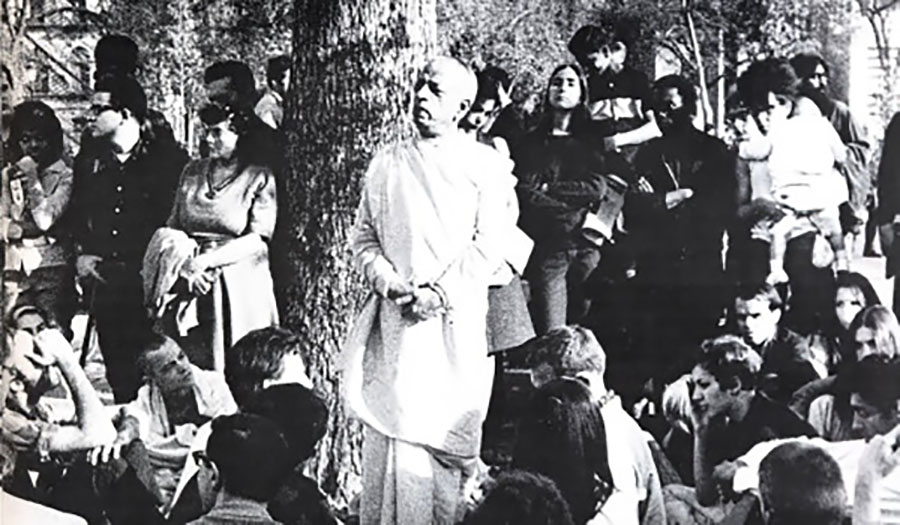ISKCON 50 Meditations: July 20, 2016
By Satsvarupa dasa Goswami | Июл 20, 2016

Firm Reins on Fledging Bhakta
Most of us were contaminated with drugs and illicit sex. Prabhupada restrained us. He controlled the activities in his apartment and storefront, and we soon got into line. There were unspoken boundaries. No one ever smoked in his apartment. He sat on one side of the silver trunk and we sat on the other. Sometimes we stood close beside him in the kitchenette or other places, but we did not get too familiar. We maintained politeness and formality out of respect. Even those who were not his disciples respected him as an elderly sadhu.
If anyone talked jive to the Swami, they didn’t get far with it. He remained who he was. He did not want to waste time, but spoke in a meaningful way about God. He insisted on that. He did not mind a challenging question, as long as it was put in a coherent way and he could direct the conversation toward God consciousness.
When things got out of hand, Prabhupada turned to Raymond or Howard and said, “His is a general question. Can you answer it?” But that did not happen often.
Prabhupada did not ask people much about their family background or education or hobbies. He wanted to speak to them about the Absolute Truth.
“I am living with my mother. She has arthritis. I don’t have enough money, so I am working two jobs.” Prabhupada would hear it with concern, but then turn the situation to ultimate matters. He was not living in the world for talking about relative situations. As a sannyasi, he had left all that behind.
It was often Prabhupada who was the challenger. Those who wished to stay with him had to come up to his level. Often someone mentioned a Western thinker whom Prabhupada had not heard of. It was a simple thing to adjust. He asked, “What is their philosophy?” – and then put it into the context of Mayavada, pantheist, or mental speculation.
Those who became his disciples required more intimate treatment. We wanted him to at least hear what was on our minds … Albert Camus, Jean Paul Sartre. The important thing was to talk about Krishna, but first you had to be released from your attachments.
I asked Prabhupada, “What about the spiritual culture of China? Is it advanced?” He simply shook his head, no. I was willing to accept that. Even to this day, I am attracted to recluses and poets of ancient China. Prabhupada did not say they were all useless, but he told me in no uncertain terms that they were not important. In the absolute sense, for going back to Godhead, it is not important. That exchange about China took place in only a moment. If we were academic scholars, I would have insisted on developing a comparison of Confucianism and Taoism and how they came from India. I would demand that he explain why it is inferior to Krishna consciousness. Perhaps I would debate with him and say that the Indian mentality is different but not necessarily better than the Chinese mentality. However, all these considerations were dispensed with in a meaningful way, just by a shake of the head. They were also dealt with in informal talks while taking Прасадам or sitting together. We heard from him submissively and accepted the Vedas from his lips.















